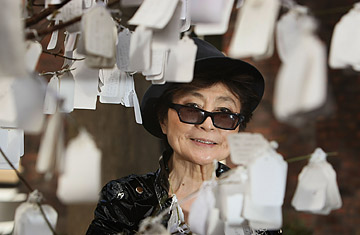
Yoko Ono
In December, it will be 30 years since a deranged assassin shot dead John Lennon. In the decades after his murder, Lennon's widow, Yoko Ono, persevered amid her own grief and the suspicions of a public that has always associated her with the fracturing of the Beatles. At the opening of her new art exhibit in Berlin — a blend of sculpture, sound and film — Ono talks with TIME about violence, forgiveness and keeping her slain husband's memory alive.
The centerpiece of your new exhibit is a thick glass window with a bullet hole through the middle. What is that about?
You are supposed to look at it from two positions. One is from the front, so you're the shooter. And one is from the back, so you're the victim.
Why do you want the viewer to see the world from both sides of the fence — as both victim and perpetrator?
No, no. Not to see the world, but to see themselves from both sides. You may be a shooter now, but you can be a victim the next day.
Is this ultimately about forgiveness? Aren't you really asking the viewer to forgive the shooter? Can you forgive John Lennon's murderer, Mark David Chapman?
I have not been able to forgive him yet. But I'm not thinking about him all the time. And that's good.
How have you dealt with John's death in your art?
It was an incredible disaster for me. It was a sudden thing. We were talking like 10 minutes before it happened. So it was really a difficult thing to deal with. But the fact that I survived, not just physically but mentally, is something that I give myself credit for. And I think that that's where I have my pride as a person. We all have to have pride as beings and I think that's where my pride is.
The relationship between you and John was always described to the outside world as very symbiotic ...
Very.
And since his death you're the protector of his legacy and memory. How hard was it for you to emerge from this alone as an individual and shake off all the stereotypes that people have about you?
Strangely enough, when I was with John, I was very concerned about being drowned in it, [about becoming] a nonperson and just Mrs. Lennon. So I was fiercely independent in many ways. And when I would write a song, I would just write it myself. But there was also a lot of partnership and doing things together. John was much more used to that. You know, he had partners — he had three partners. And his partnership with Paul [McCartney] was very close. I was always used to doing things alone, like a lone wolf. And just when I got used to the partnership with John, he was taken away from me. At first I didn't know how to cope with it. Then I realized that I could keep giving things to John's fans because they were all terribly devastated at the time. I really felt that it was my responsibility as his partner to make sure that they were going to be all right. So I promised them that every year I would give them something from John. This year I am releasing remastered versions of 121 of his songs.
Are you planning anything in John's memory on Dec. 8, the 30th anniversary of his death?
Well, I got very lucky. Ten years ago the Japanese people said they wanted to do something for John and get all the big Japanese rockers to play his songs as a tribute. We wanted to give money raised to create schools in Africa. Over the past 10 years we've created more than 100 schools. And not just Africa anymore — now we're doing it for Asia and South America.
And what are you planning this year?
It's the 10th anniversary so it's going to be a big, big concert at Budokan, where the Beatles did their first concert in Japan. And this is how I changed the negativity of Dec. 8 into a positive event.
Is this your way of dealing with so many painful experiences in your life?
It's like when the whole world hated me because they thought I broke up the Beatles, and that hate vibe kept coming at me. I could have been killed by that vibe. But instead I found a way to transform that hate vibe into love energy. That's big.
During the Vietnam War you and John held bed-ins, singing "Give Peace a Chance." If John were alive today, what do you think the two of you would be doing in the face of the wars now in Afghanistan and Iraq?
Well, I'm doing it. I'm promoting Imagine Peace every day. It's a kind of group meditation and people are participating all around the world. You just have to imagine that our society can be a peaceful society. It's a meditation. When you're imagining peace, you can't kill anyone. That's good isn't it?
